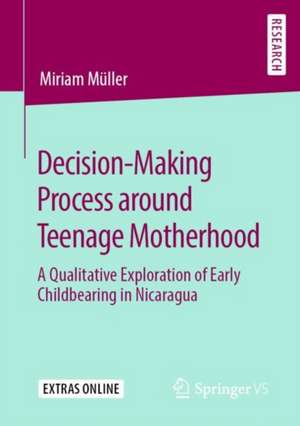Decision-Making Process around Teenage Motherhood: A Qualitative Exploration of Early Childbearing in Nicaragua
Autor Miriam Mülleren Limba Engleză Paperback – 5 dec 2019
Preț: 387.75 lei
Nou
Puncte Express: 582
Preț estimativ în valută:
74.21€ • 77.27$ • 62.71£
74.21€ • 77.27$ • 62.71£
Carte tipărită la comandă
Livrare economică 10-24 martie
Preluare comenzi: 021 569.72.76
Specificații
ISBN-13: 9783658287740
ISBN-10: 3658287748
Pagini: 319
Ilustrații: XVII, 319 p. 26 illus.
Dimensiuni: 148 x 210 mm
Greutate: 0.41 kg
Ediția:1st ed. 2020
Editura: Springer Fachmedien Wiesbaden
Colecția Springer VS
Locul publicării:Wiesbaden, Germany
ISBN-10: 3658287748
Pagini: 319
Ilustrații: XVII, 319 p. 26 illus.
Dimensiuni: 148 x 210 mm
Greutate: 0.41 kg
Ediția:1st ed. 2020
Editura: Springer Fachmedien Wiesbaden
Colecția Springer VS
Locul publicării:Wiesbaden, Germany
Cuprins
Agency, Aspirations, and Identity Development.- Immediate Barriers or Facilitators of Sexual and Reproductive Decision-Making.- Norms around Women’s (and Men’s) Roles in Relationships.- Opportunities and Teenage Pregnancy: The Role of Education and Employment.- Enabling Environments to Develop Resilience.- Consequences of Teenage Pregnancy – a Gendered Poverty Trap.
Notă biografică
Dr. Miriam Müller is a sociologist working on gender and development. She has worked in Asia, Latin America and Africa and focuses on qualitative research.
Textul de pe ultima copertă
The objective of this study is to understand the perceptions, beliefs, and influencing factors that may lead to different fertility outcomes among young women in Nicaragua, a country with one of the highest adolescent fertility rates in Latin America. The results are based on qualitative data collected in urban areas. Miriam Müller reveals that two structural constraints affect women’s choices and their capacity to actively participate in defining their life paths: poverty and traditional gender norms.This book contributes to the discussion of intergenerational transmission of poverty by disentangling the mechanisms behind decision-making around teenage motherhood and by describing the consequences of these decisions.
Contents
■Agency, Aspirations, and Identity Development
■Immediate Barriers or Facilitators of Sexual and Reproductive Decision-Making
■Norms around Women’s (and Men’s) Roles in Relationships
■Opportunities and Teenage Pregnancy: The Role of Education and Employment
■Enabling Environments to Develop Resilience■Consequences of Teenage Pregnancy – a Gendered Poverty Trap
Target Groups
■Lecturers and students of sociology, social work, gender studies, health sciences, Latin American studies
■Employees in development cooperation in the fields of youth, health, education and gender equityThe Author
Dr. Miriam Müller is a sociologist working on gender and development. She has worked in Asia, Latin America and Africa and focuses on qualitative research.
Caracteristici
A Study in Sociology Additional Data Available Online
